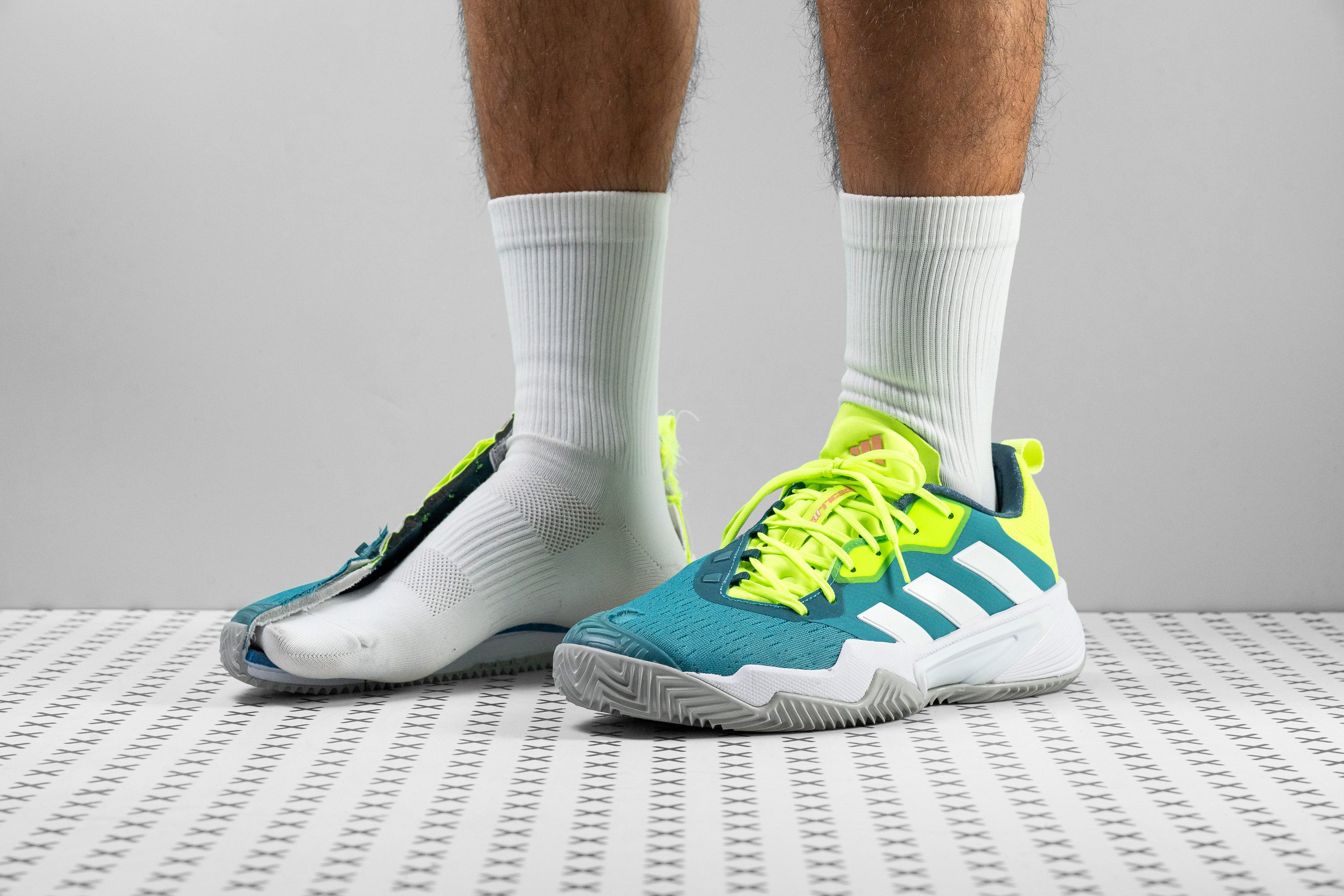Our verdict
- Top pick in best Adidas tennis shoes
Pros
- Exceptional stability and support
- Incredibly durable upper and outsole
- Generous impact protection
- Fun and responsive cushioning
- Highly secure foothold
- Wide and steady platform
- Good level of flexibility
- Excellent grip but can slide too
- An ounce lighter than the predecessor
Cons
- Lacks breathability
- Heel drop can be too drastic for some
Audience verdict
Comparison
The most similar tennis shoes compared
+ + Add a shoe | |||||
|---|---|---|---|---|---|
| Audience score | 83 Good! | 88 Great! | 84 Great! | 91 Superb! | |
| Price | $160 | $160 | $170 | $150 | |
| Shoe type | Clay Court | All CourtHard Court | Hard Court | All CourtHard Court | |
| Shock absorption | - | Moderate | Moderate | Low | |
| Energy return | - | Low | Low | Low | |
| Traction | - | High | - | Moderate | |
| Construction | Stability | Stability | Stability | Stability | |
| Breathability | Moderate | Moderate | Moderate | Moderate | |
| Weight lab | 13.3 oz / 378g | 13.9 oz / 394g | 14.3 oz / 406g | 13.9 oz / 393g | |
| Drop lab | 12.4 mm | 11.3 mm | 10.4 mm | 10.9 mm | |
| Width / fit | Wide | Medium | Medium | Medium | |
| Toebox width | Medium | Medium | Narrow | Narrow | |
| Size | True to size | Slightly small | True to size | True to size | |
| Midsole softness | Balanced | Balanced | Firm | Firm | |
| Stiffness | Stiff | Moderate | Stiff | Moderate | |
| Torsional rigidity | Stiff | Stiff | Stiff | Stiff | |
| Heel counter stiffness | Moderate | Stiff | Moderate | Stiff | |
| Midsole width - forefoot | Average | Wide | Wide | Average | |
| Midsole width - heel | Very wide | Wide | Average | Average | |
| Outsole durability | Bad | Decent | Good | Good | |
| Heel padding durability | Good | Decent | Bad | Bad | |
| Collaboration | - | - | Novak Djokovic | - | |
| Heel stack lab | 30.2 mm | 28.4 mm | 32.2 mm | 32.5 mm | |
| Forefoot | 17.8 mm | 17.1 mm | 21.8 mm | 21.6 mm | |
| Insole thickness | Thick | Thick | Average | Average | |
| Removable insole | ✓ | ✓ | ✓ | ✓ | |
| Heel tab | Finger loop | Extended heel collar | None | None | |
| Toebox durability | Good | Decent | Good | Good | |
| Outsole hardness | Soft | Average | Average | Average | |
| Outsole thickness | Average | Very thin | Thin | Average | |
| Ranking | #21 Top 50% | #10 Top 24% | #22 Bottom 47% | #3 Top 8% | |
| Popularity | #38 Bottom 9% | #9 Top 22% | #2 Top 5% | #1 Top 3% |
Who should buy
Disclaimer: This review focuses on the 2023 edition of the Adidas Barricade 13 Clay. It features Bounce foam in the midsole. For 2024, the Barricade 13 introduces a dual-density Repetitor+ foam along with a few upper updates.
We are happy to report that the Adidas Barricade 13 Clay continues to be a one-stop-shop for seasoned athletes who:
- seek unmatched stability and arch support in tennis shoes
- slide and drag their toes very aggressively on the court
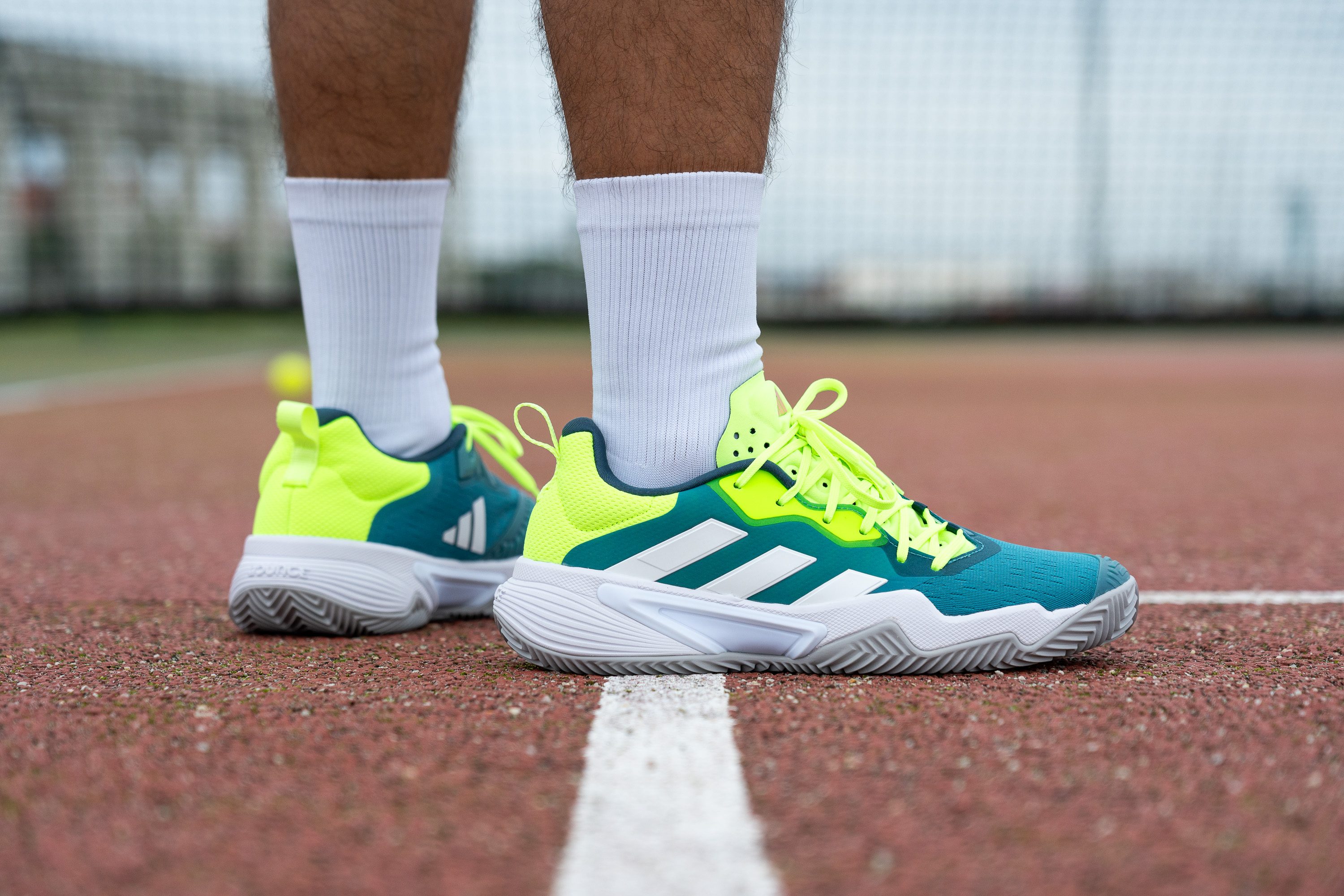
Who should NOT buy
The Adidas Barricade 13 Clay is not a cheap shoe but it has a lot to offer for the price. The question is do you need it all?
You may be okay with not having the highest level of stability in return for a lighter and more affordable option. Such as the Adidas Ubersonic 4.1 or the Adidas Solematch Control.
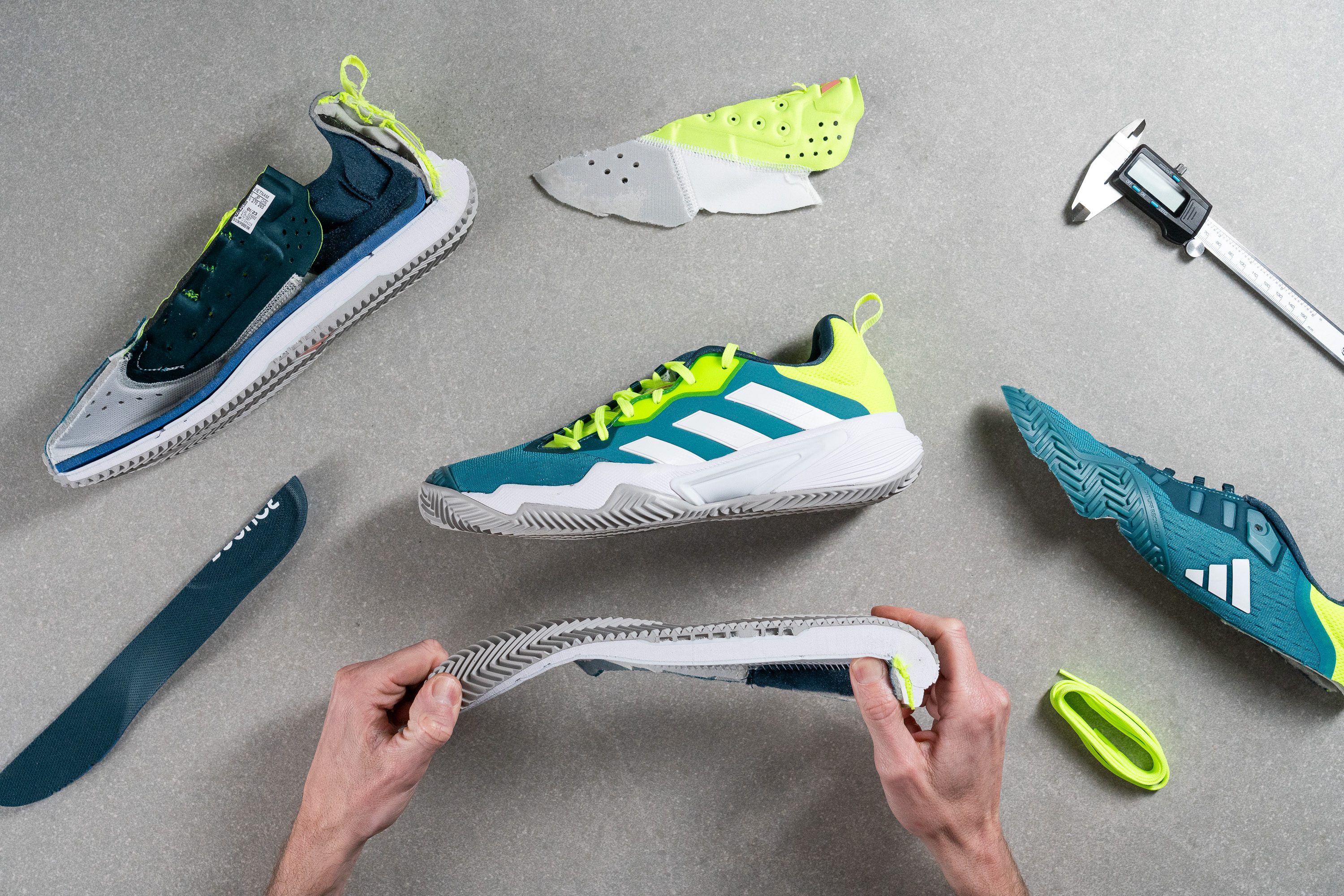
Cushioning
Heel stack
Right from the start, our feet felt treated to the generous heel cushioning of this Adidas shoe. It offers plenty of impact protection for going hard on those serves and forceful landings.
Using a caliper, we measured the shoe's heel stack at 30.2 mm. Having so much foam under the heel, the Barricade 13 Clay is surely in the upper tier of tennis shoes.
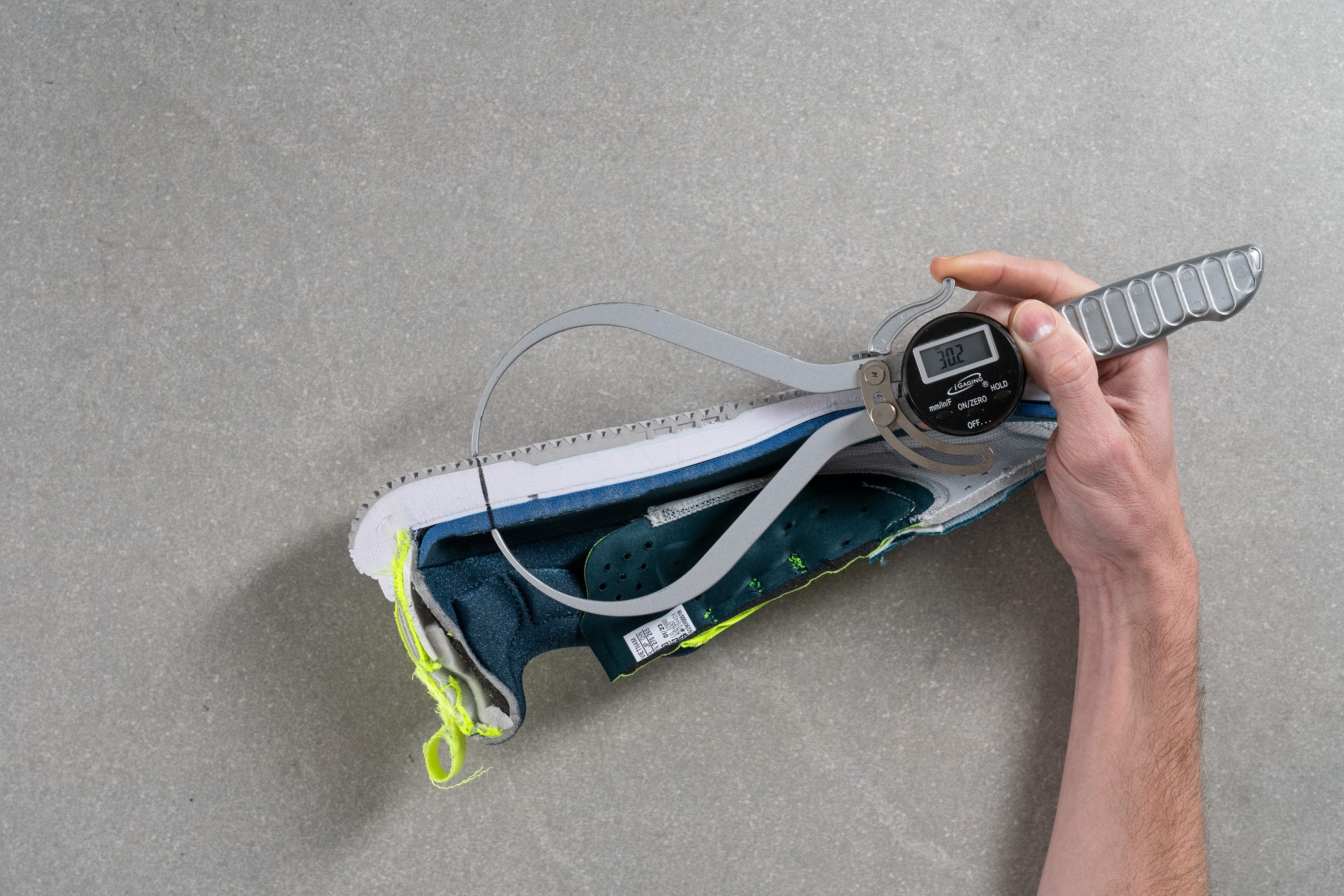
| Barricade 13 Clay | 30.2 mm |
| Average | 29.2 mm |
Forefoot stack
By contrast, the forefoot of this Adidas tennis shoe feels much closer to the ground. Based on our caliper measurements, the forefoot stack is as low as 17.8 mm.
A couple of millimeters thinner than average, it made the balls of our feet feel unusually intimate with the court. While this is a matter of personal preference, we found that it helped us pivot easier and stay more maneuverable.
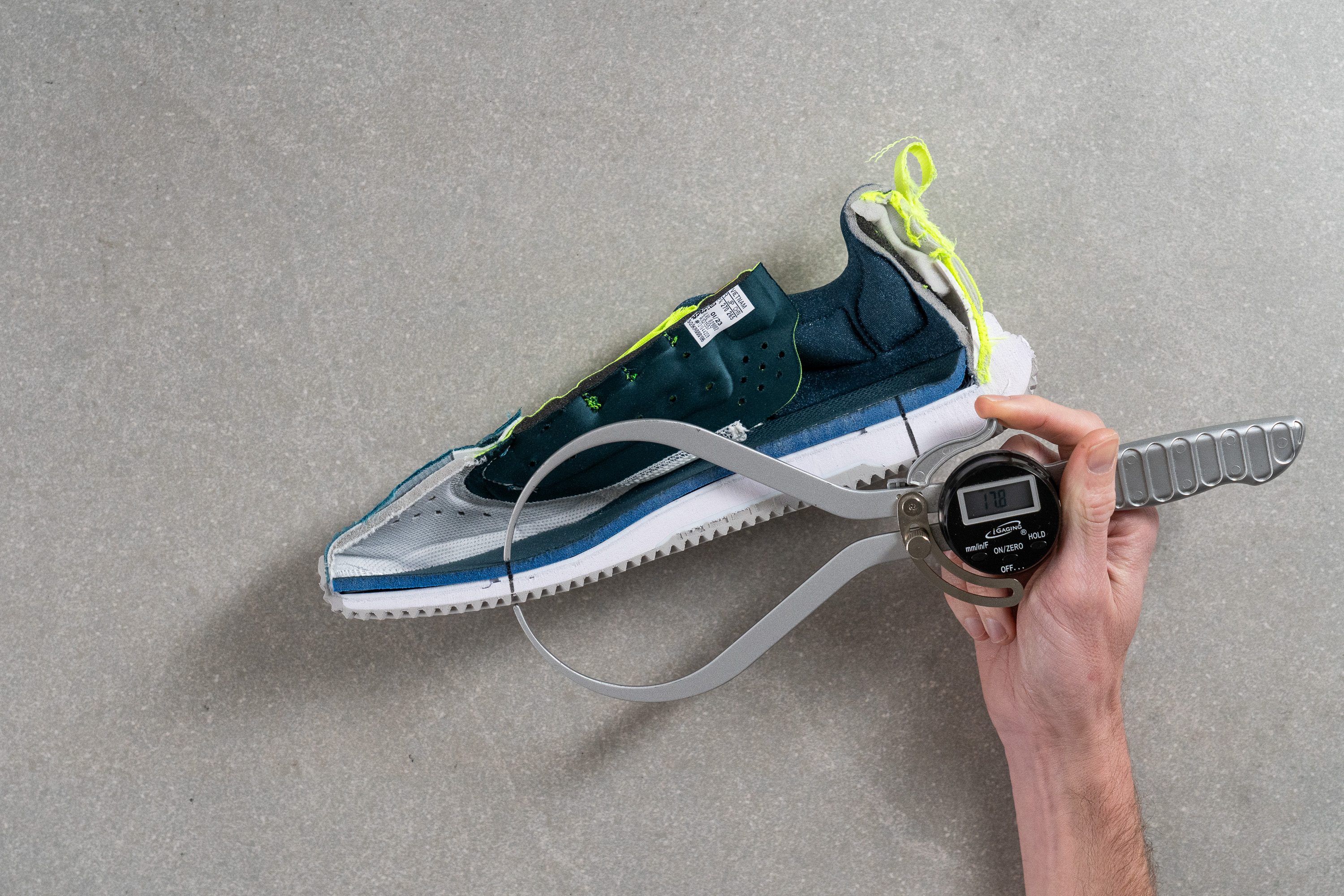
| Barricade 13 Clay | 17.8 mm |
| Average | 19.3 mm |
Drop
As a result, the difference in height between the shoe's heel and forefoot is pretty tangible. At 12.4 mm, it is slightly higher than the average of tennis shoes.
Neither good nor bad, this setup puts an emphasis on impact protection in the heel and court sensitivity in the toes. But if you enjoy a more grounded experience, try the ASICS Gel Resolution 9 Clay (10.2 mm).
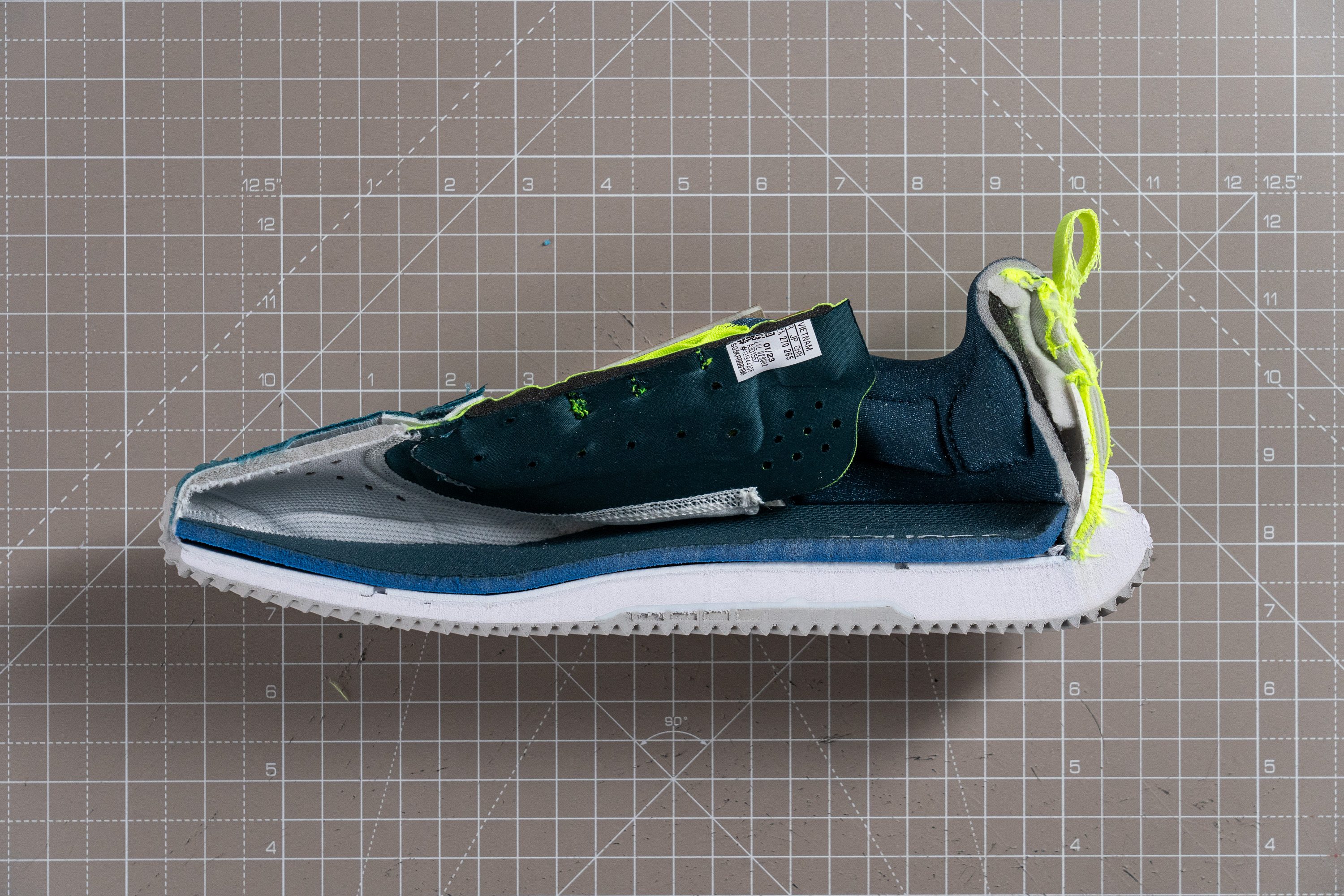
| Barricade 13 Clay | 12.4 mm |
| Average | 9.9 mm |
Midsole softness
As we are reviewing the 2023 edition of the Adidas Barricade 13 Clay, it comes with a full-length single-density Bounce foam. As the name suggests, this cushioning stands out with its responsive properties. Moderately firm, it added a nice little spring to our push-offs.
Measuring its softness with a durometer, we recorded 29.5 HA. That's an average reading across tennis shoes.
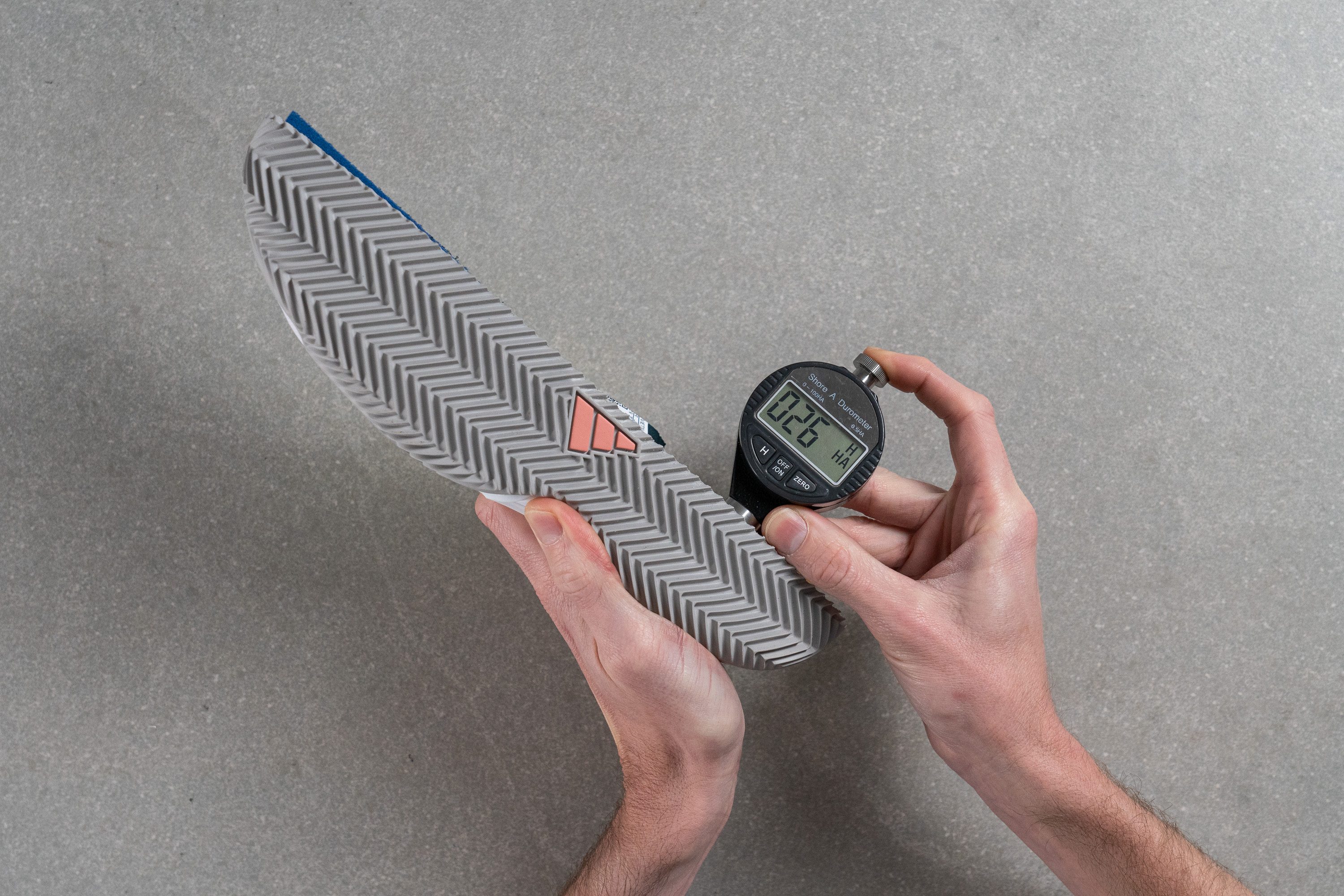
However, in the 2024 edition of the Barricade 13 Clay, the shoe features a dual-density Repetitor+ foam. Upon first impression, it feels firmer in the heel and softer in the forefoot but overall not as lively as the Bounce midsole.
| Barricade 13 Clay | 26.0 HA |
| Average | 28.1 HA |
Size and fit
Size
Adidas Barricade 13 Clay fits true to size (19 votes).
Internal length
| Barricade 13 Clay | 274.1 mm |
| Average | 271.2 mm |
Width / Fit
Putting the Adidas Barricade 13 Clay on for the very first time, it felt like the shoe was tailor-made for our feet - very form-fitting yet cozy. We didn't experience any pinching, squeezing, or toe jamming during the playtest either.
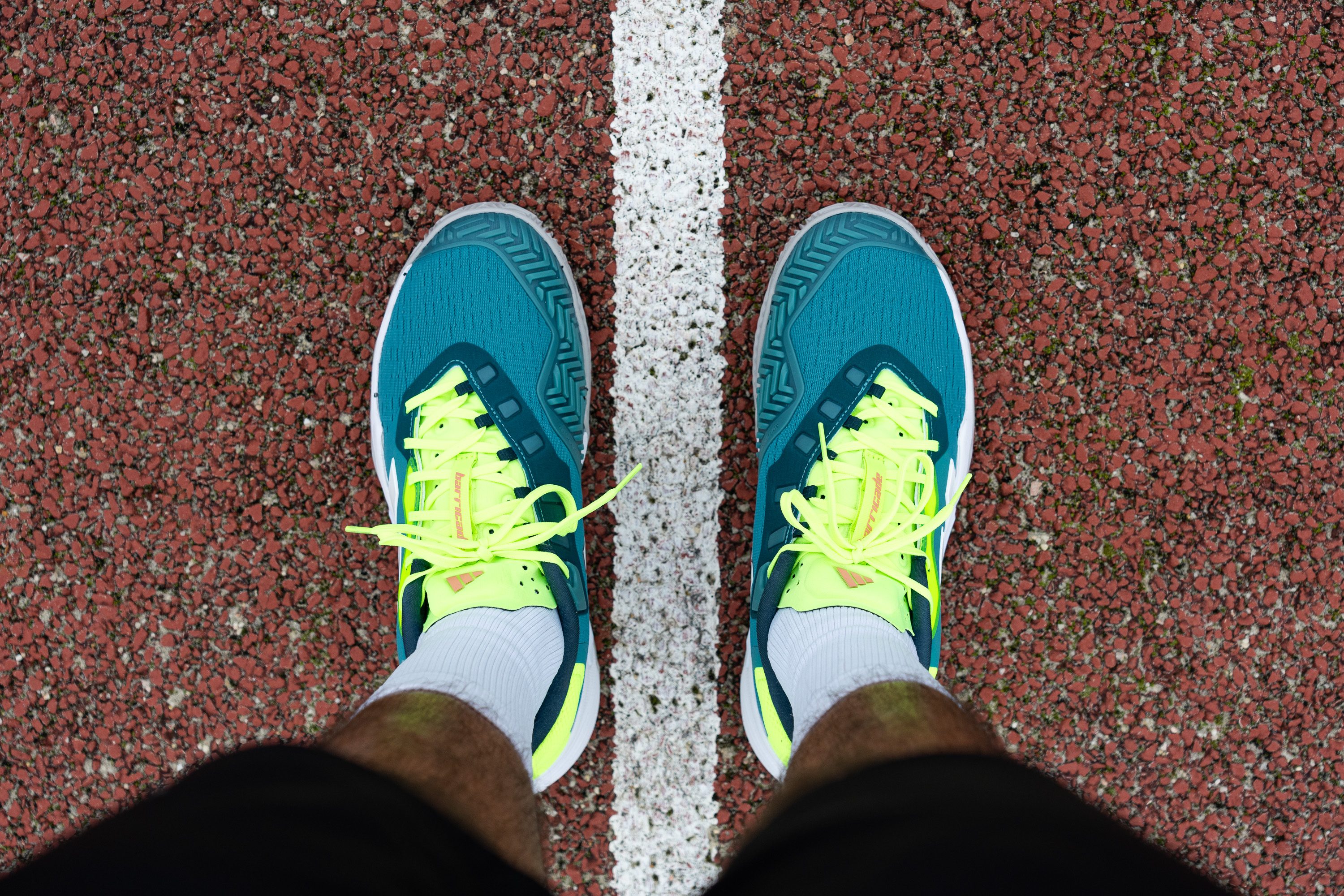
Measuring the shoe's toebox in the widest part, we got 104.2 mm in a men's US size 9 (standard width). Even though it is slightly wider than average, it didn't feel loose at all.
This test follows an older methodology, which is why you don't see recently tested shoes in the chart. Results from different methodologies can not be compared.
| Barricade 13 Clay | 104.2 mm |
| Average | 101.0 mm |
Toebox width
As you can see from the shoe's rounded toebox shape, it doesn't taper very much either. Based on our caliper, its forefoot width comes in at 76.9 mm at the big toe mark. That's a standard measurement across tennis shoes.
This test follows an older methodology, which is why you don't see recently tested shoes in the chart. Results from different methodologies can not be compared.
| Barricade 13 Clay | 76.9 mm |
| Average | 76.9 mm |
Flexibility / Stiffness
Even though the Barricade 13 Clay is extremely rigid torsionally, it has more than enough flexibility in the forefoot to make us feel in control of the movement.
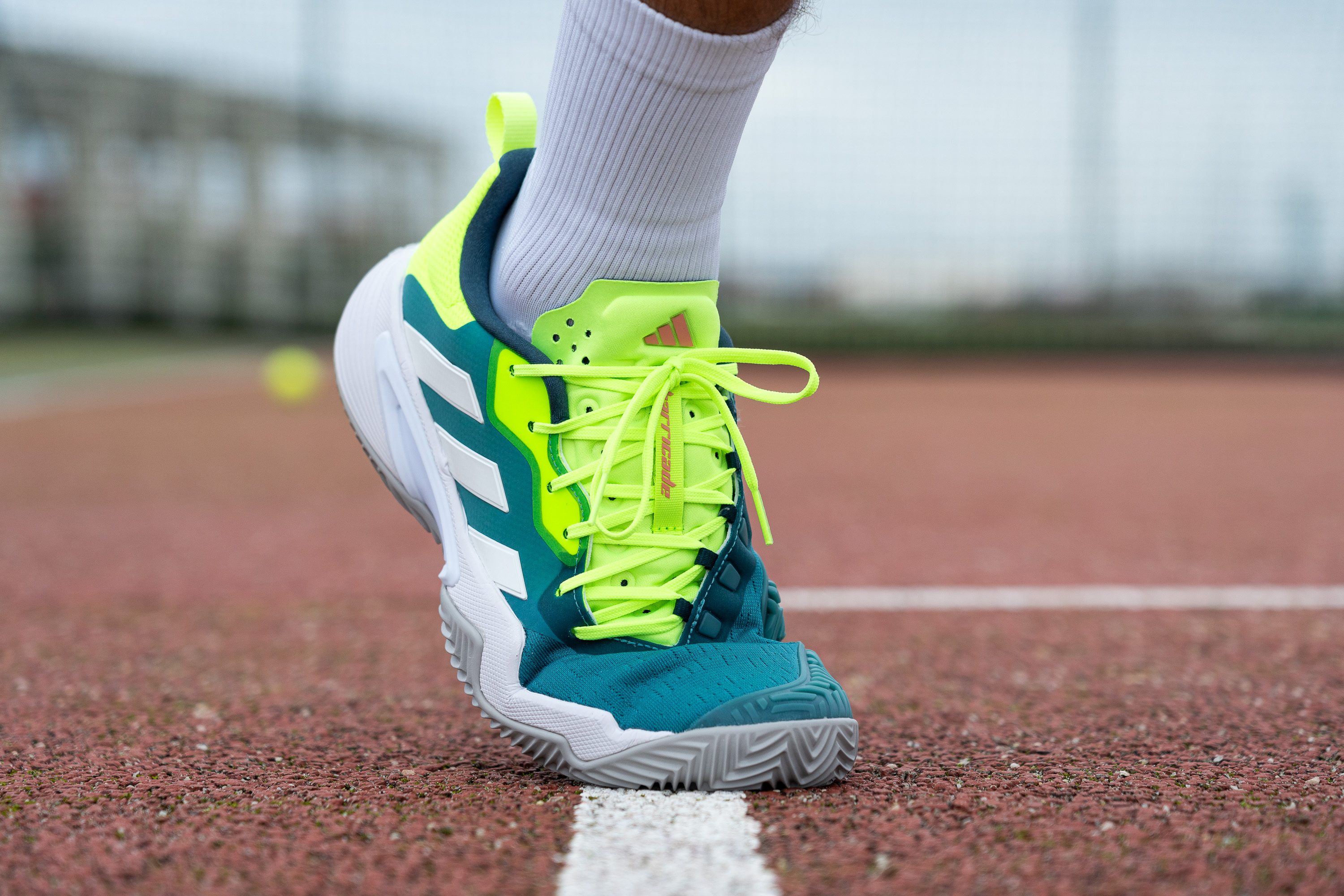
To measure the shoe's level of flexibility more precisely, we pushed it to a 90-degree angle with a force gauge. The tool showed that it took 21.0N to bend the shoe like that. That's a whole 40% less than it takes a tennis shoe on average!
This test follows an older methodology, which is why you don't see recently tested shoes in the chart. Results from different methodologies can not be compared.
| Barricade 13 Clay | 21.0N |
| Average | 30.7N |
Weight
Traditionally, the Adidas Barricades have been compared to bricks for their extra heft. But the 13th edition changes that trend.
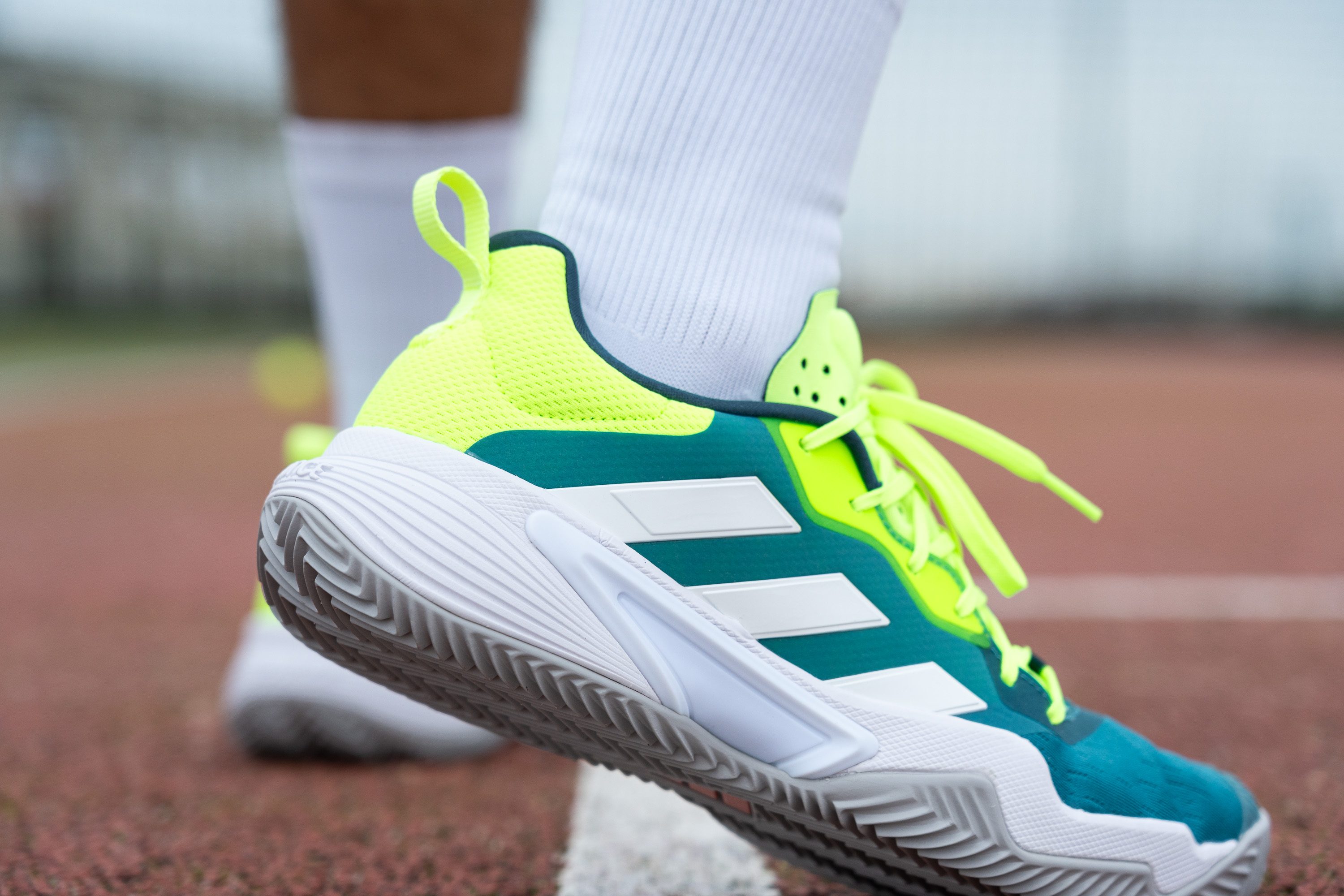
The shoe takes a quantum leap from the bulky 14.5 oz (410g) of the preceding model to the much more agreeable 13.4 oz (378g). We measured both shoes in a men's US size 9 and the difference is nearly an ounce!
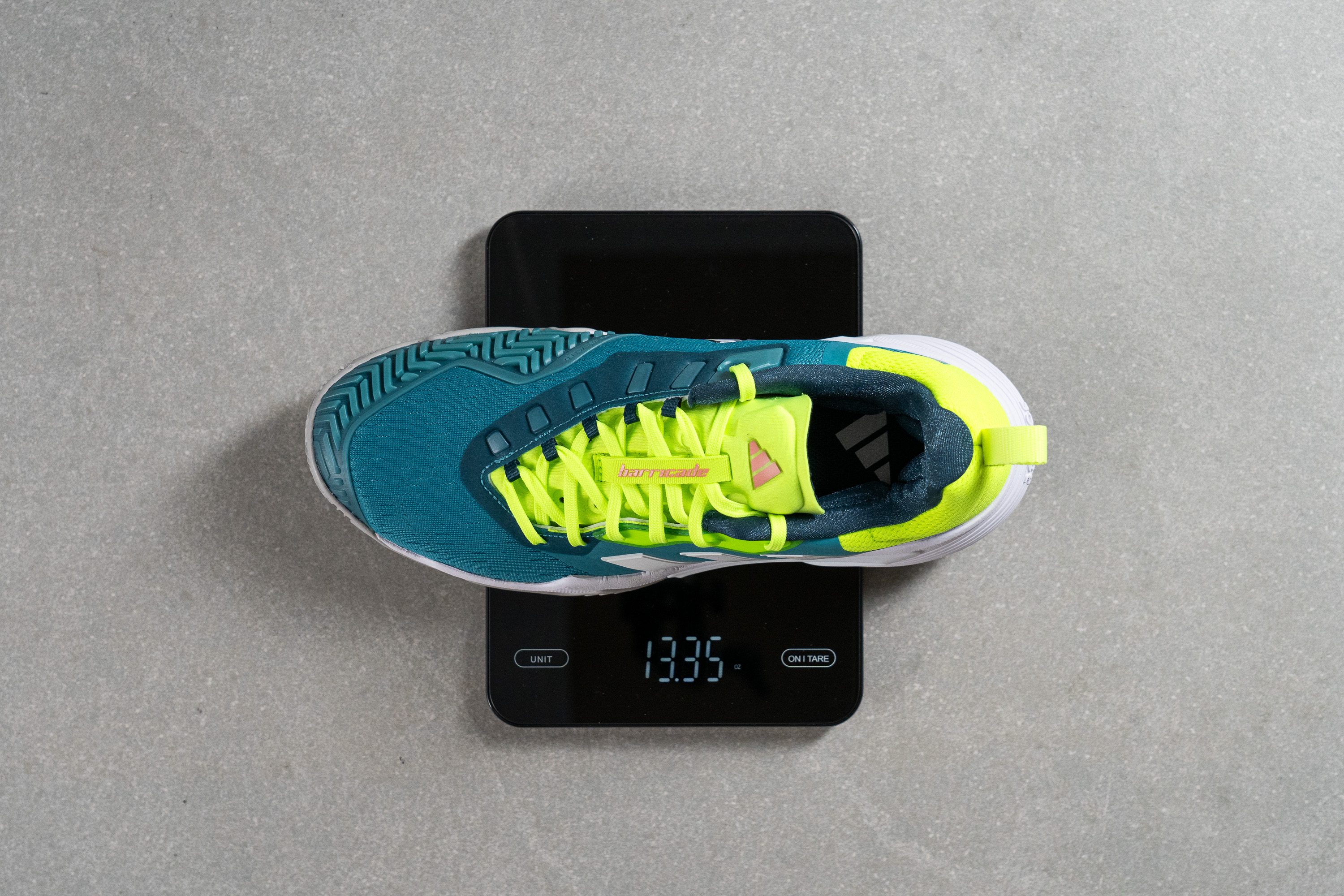
For the amount of cushioning, supportive elements, and reinforcements packed into it, the Barricade 13 Clay never once dragged our feet down. Truly amazing improvement!
| Barricade 13 Clay | 13.3 oz (378g) |
| Average | 12.8 oz (364g) |
Breathability
The fact that this Adidas shoe uses mesh for the upper made us hopeful for breathability. But unfortunately, the Barricade 13 Clay didn't do better than the average tennis shoe in their regard. Towards the end of the playtest, we found our feet yearning for fresh air.
Taking the shoe back to our lab, we filled its interiors with smoke and found that the upper indeed didn't let the heat escape so easily. Most of the airflow was coming through the shoe's tongue which had more than a few ventilation holes in it.
Some of those apertures can be seen in our transparency test below.
Assessing the shoe's capacity to breathe on a 1-5 scale, we gave it a moderate score of 3. It's not toasty but it won't keep your feet fresh on a hot summer day either.
To take our scrutiny a step further, we looked at the shoe's mesh toebox through a microscope.
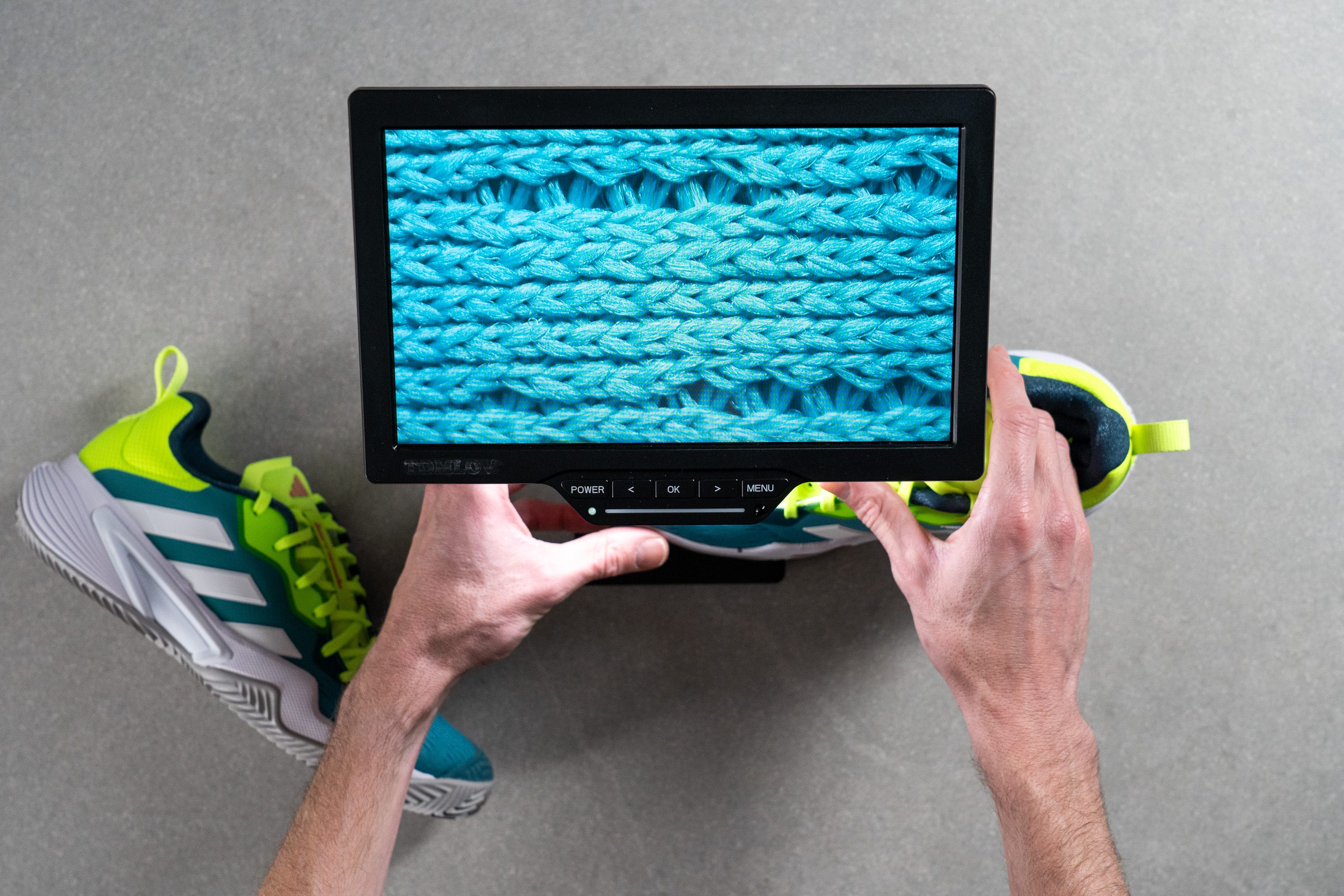
Now it's kind of hard to call it "mesh." Looking at those thick, densely woven threads, the fabric looks much more like a sweater. It has slightly more porous chainlinks here and there but they don't seem to be making a big difference to the airflow.
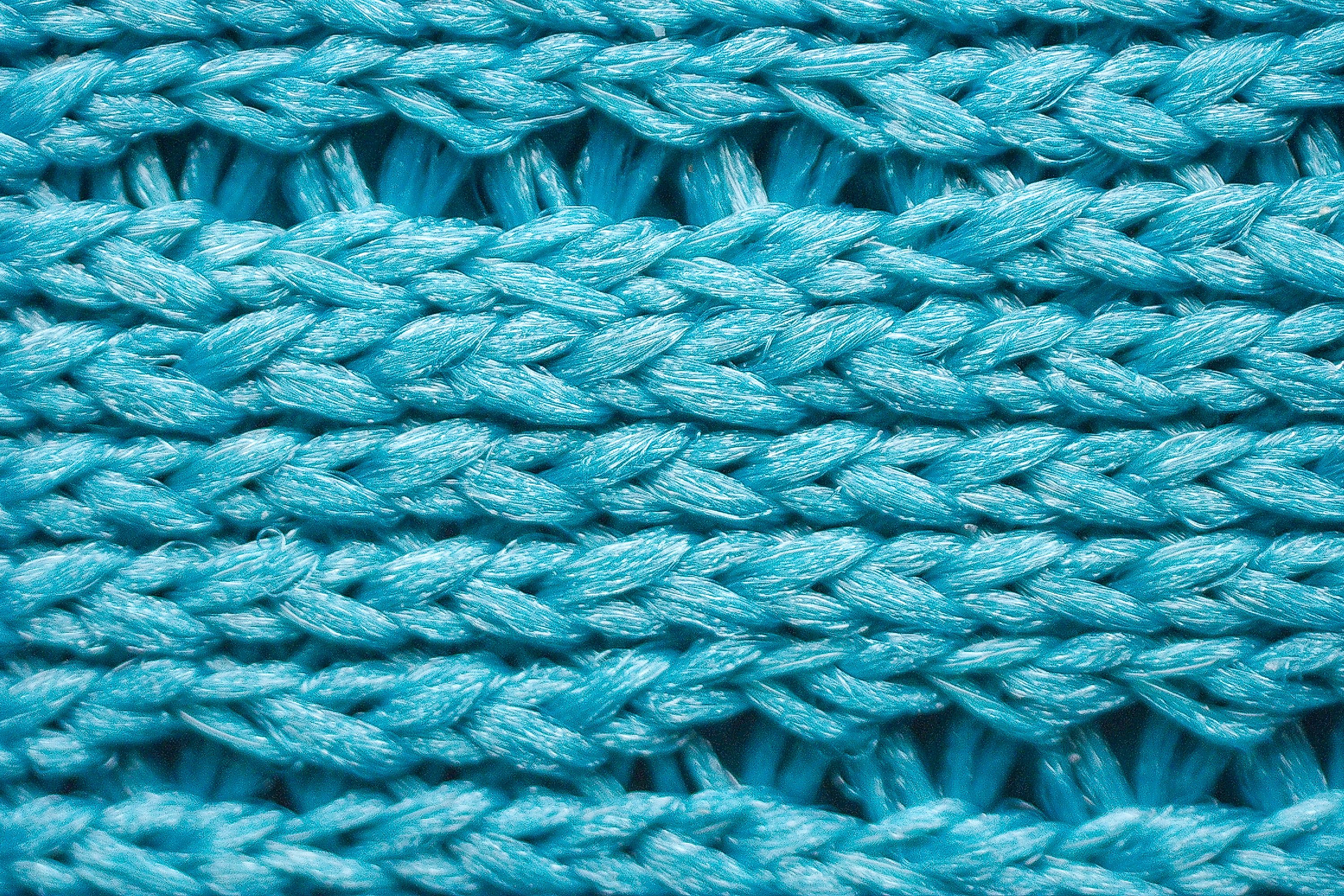
| Barricade 13 Clay | 3 |
| Average | 3.1 |
Stability
Lateral stability test
The Bassicade 13 Clay stays true to its roots by delivering the highest level of lateral stability and arch support in a tennis shoe.
No matter how intense the game got, this Adidas shoe never made us feel off-balance or, god forbid, let our ankles buckle. This is the kind of shoe you get if you want to get away from the wobbliness of poorly constructed shoes.
Torsional rigidity
The key component that makes the Adidas Barricade 13 Clay feel so extraordinarily stable is the external shank called the Torsion System. One could say that this is the "barricade" of the shoe. Stiff like a brick wall, it braces the midfoot on both sides creating a sturdy barrier for the foot arch. We never felt as if our arches were about to collapse inward in this Adidas shoe.
Our attempt to twist this Adidas shoe was of no effect. On a 1-5 scale, the torsional rigidity of this tennis shoe deserves the maximum 5.
| Barricade 13 Clay | 5 |
| Average | 4.5 |
Heel counter stiffness
In the rearfoot, our heels and ankles also felt very securely locked in. There was not a hint of heel slippage or undue footplay.
Assessing the shoe's heel counter stiffness on a 1-5 scale, we gave it a high score of 4. It has a very rigid base but gets more pliable towards the top, allowing just enough ankle freedom for dynamic footwork and awkward leg angles.
| Barricade 13 Clay | 4 |
| Average | 4.1 |
Midsole width - forefoot
The Barricade 13 Clay sits on a pretty wide platform with an ample outrigger in the forefoot. We measured the widest part of it at 111.9 mm which is standard for a tennis shoe.
On the court, it turned out to be more than enough landing area for extreme lateral movements and pushing off the side of the shoe.
| Barricade 13 Clay | 111.9 mm |
| Average | 112.0 mm |
Midsole width - heel
Where the Barricade 13 breaks out of the average is the heel platform. In its widest part, our caliper showed that it is a whopping 98.3 mm wide! That's nearly a centimeter wider than the average and added plenty of confidence during our playtest.
| Barricade 13 Clay | 98.3 mm |
| Average | 89.8 mm |
Durability
Toebox durability
The biggest upgrade to the Barricade 13 Clay has got to be an insanely reinforced toe drag guard called the Adituff Recycled. Its massive treads are just as aggressive as those on the outsole, elevating the shoe's wear resistance to the next level.
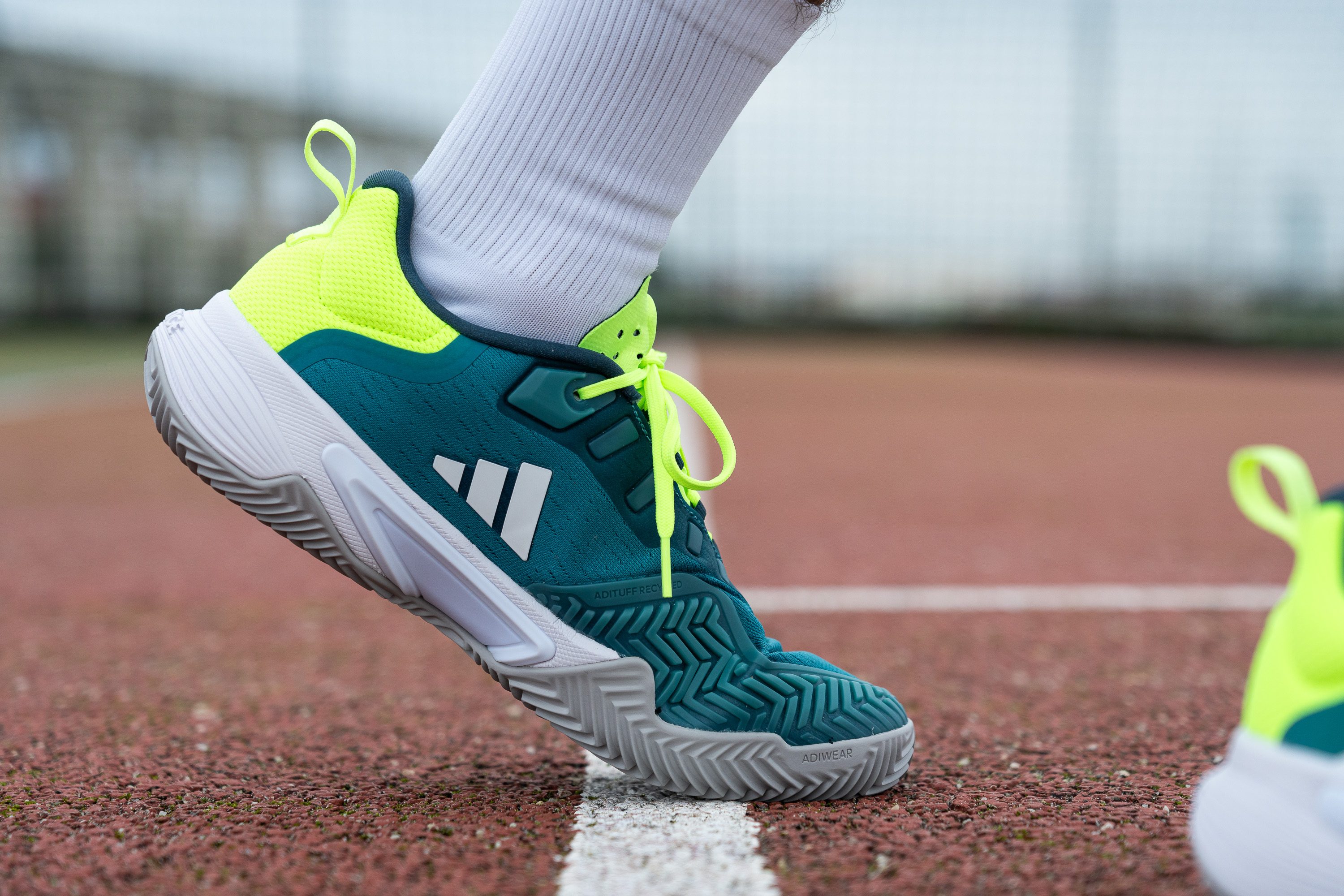
But how about mesh? Will it get destroyed if you accidentally brush it against the court? Well, not really!
As our Dremel durability test shows, the shoe's textile is ready for some serious wear and tear. We pressed the sandpaper tip against it at consistent pressure (3.2N) and speed (5K RPM) for 12 seconds. And it didn't even cut through the fabric!
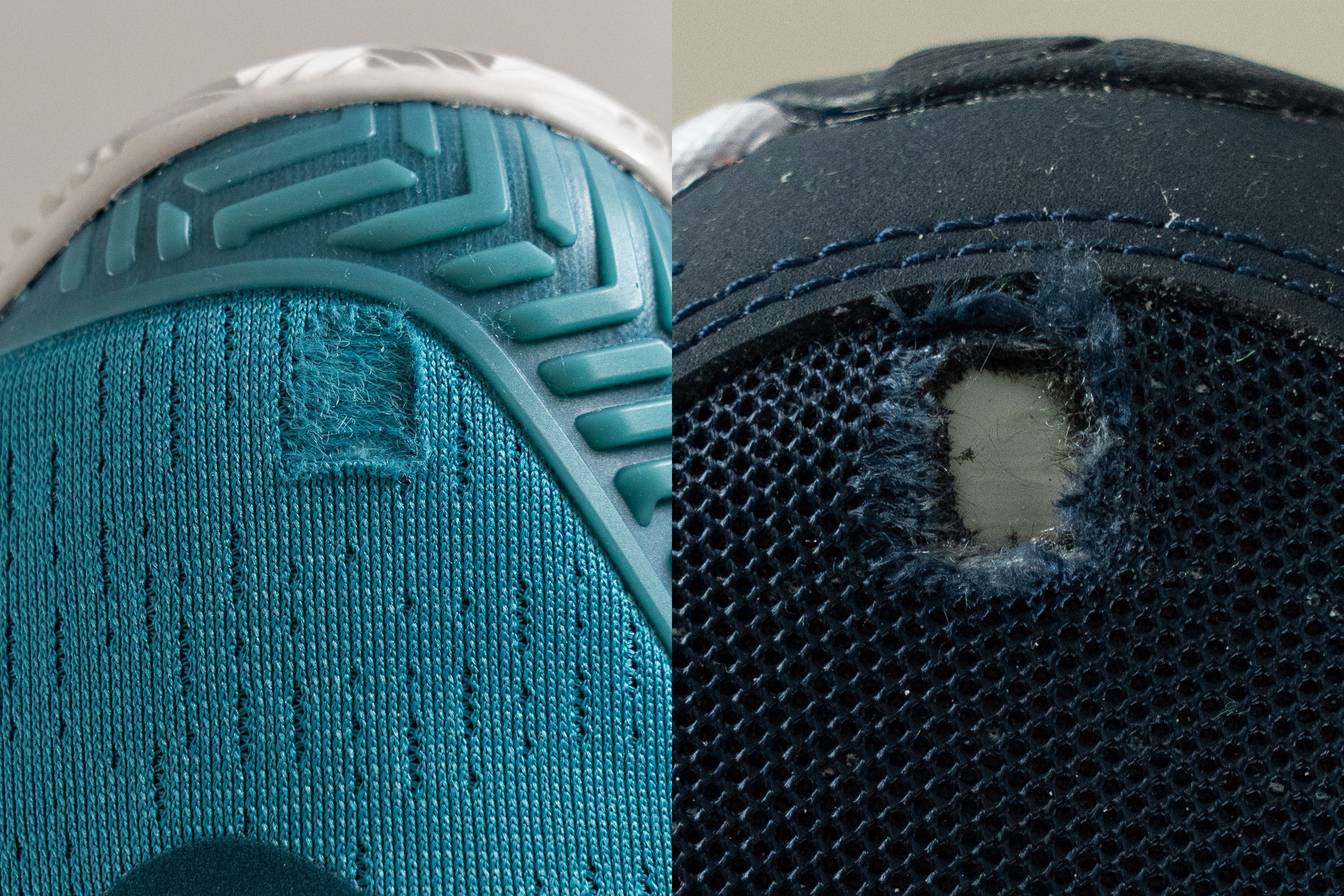
Sure, the scuffing is obvious but compared to what other mesh uppers look like after the same test (the shoe on the right), we are stunned by this Barricade. The shoe earns a solid 4 out of 5 for toebox durability!
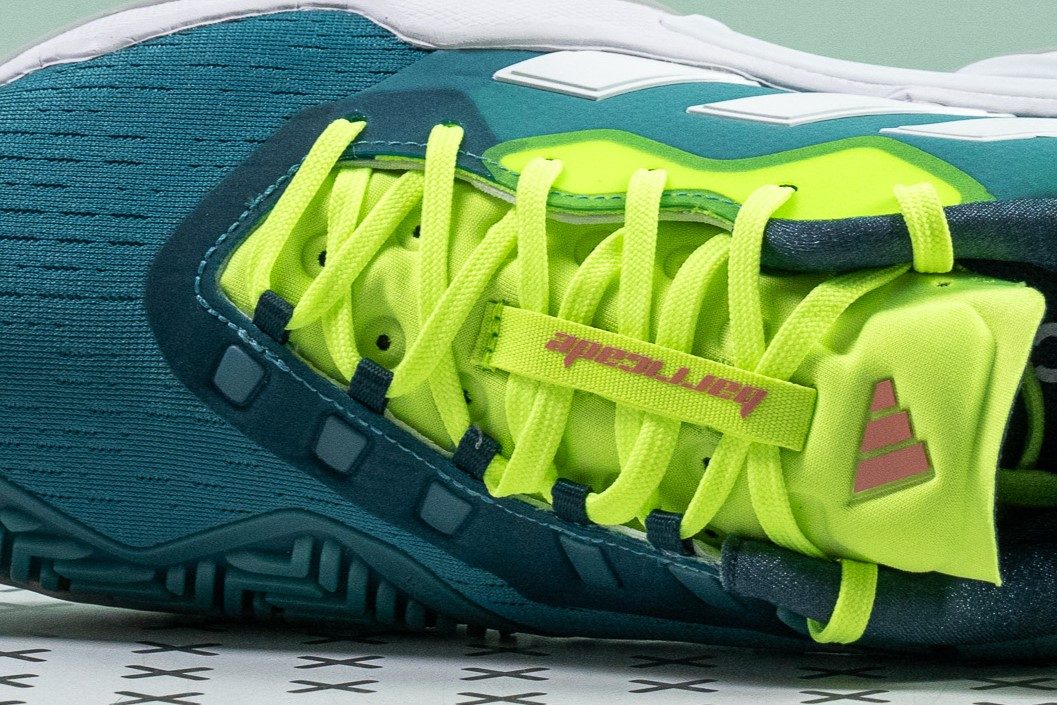
Adidas even took care of the shoe's laces and lace loops by adding a sturdy PU overlay around them. That way, brushing the shoe's upper against the court is less likely to damage the lacing itself.
| Barricade 13 Clay | 4 |
| Average | 3.7 |
Heel padding durability
What's especially exciting is that Adidas paid just as much attention to the wear resistance of the shoe's inner lining! Made of a densely woven, even slick, textile, it turned out to be mind-blowingly sturdy!
Keeping the Dremel set to 5K RPM, we applied its sandpaper tip to the inner side of the shoe's heel for 4 seconds. Looking at the photo below, you probably couldn't even tell that we touched the shoe on the left!
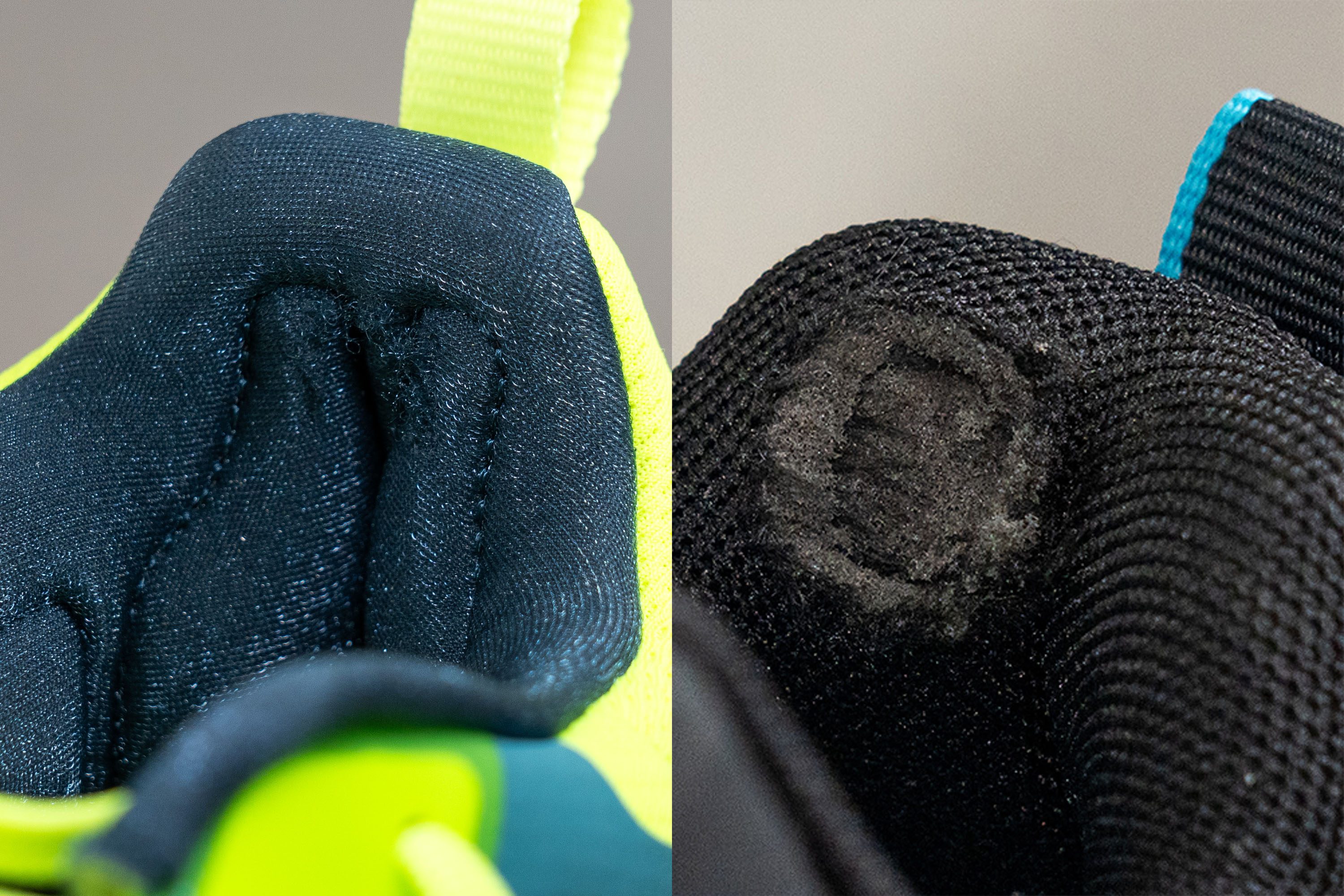
And yet, the shoe on the right shows how destructive 4 seconds of Dremel touch can be! It certainly creates contrast and convinces us to rate the Barricade's heel padding durability with the highest score of 5 out of 5.
| Barricade 13 Clay | 5 |
| Average | 3.3 |
Outsole hardness
Who are we? Aggressive tennis players! What do we want? Highly durable outsoles!
And that's exactly what the Adidas Barricade 13 Clay delivers with the brand's renowned Adiwear rubber. Using a durometer, we measured its firmness at 79.0 HC.
It is not the hardest one in our lab but is just right for a clay court shoe. This type needs to be slightly softer and tackier than hard court shoes to ensure a better grip on clay.
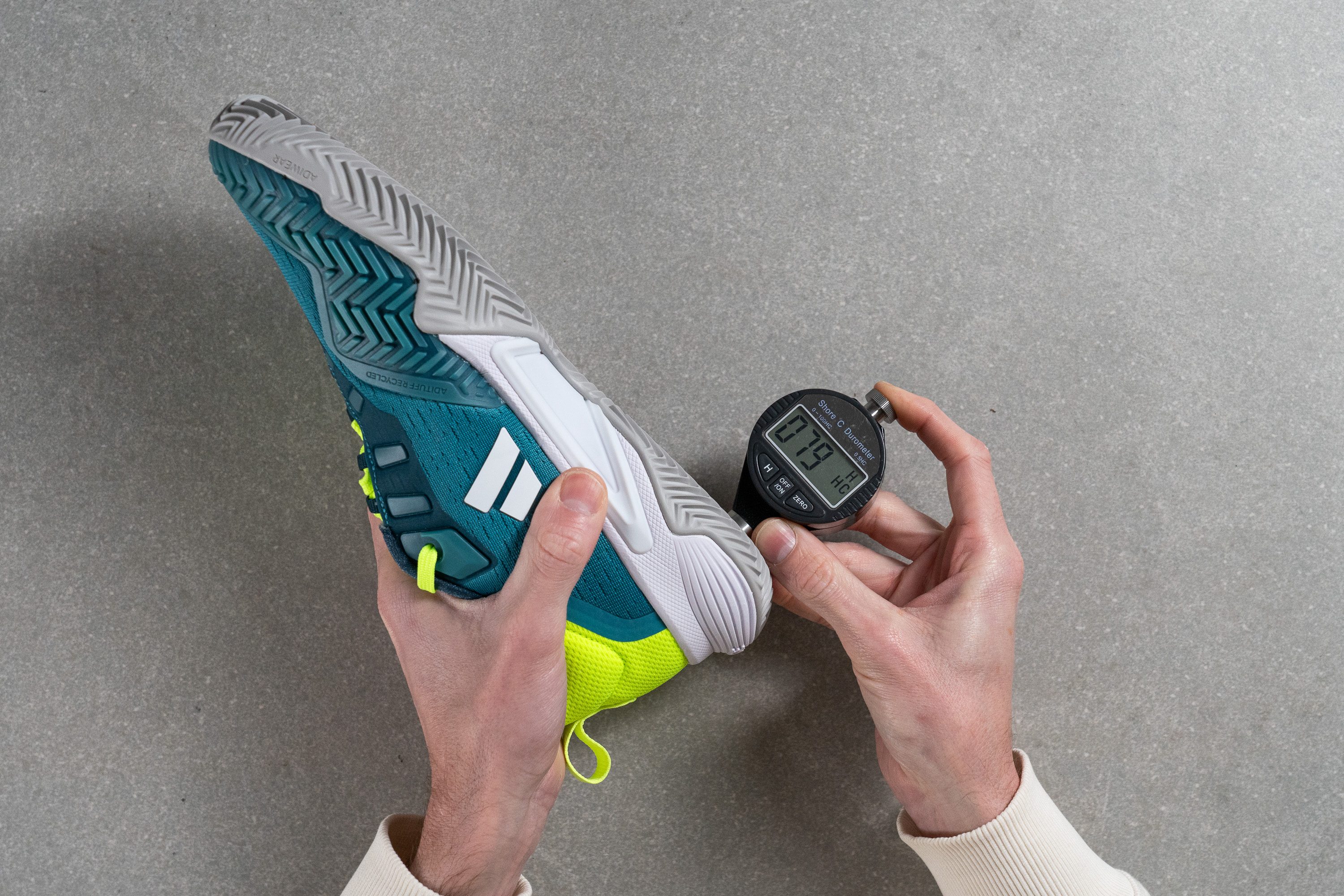
| Barricade 13 Clay | 79.0 HC |
| Average | 86.0 HC |
Outsole durability
Setting the Dremel speed to the more demanding 10K RPM, we apply it to the shoe's treading for 22 seconds. This is our way of mimicking the abrasion of many hours spent on the court.
Even though sharp lugs of a herringbone outsole are easier to damage compared to flatter treads, the Barricade 13 Clay showed strong resistance to the sandpaper. According to our tread gauge, the dent was only 1.06 mm deep. Great result for a clay court shoe.
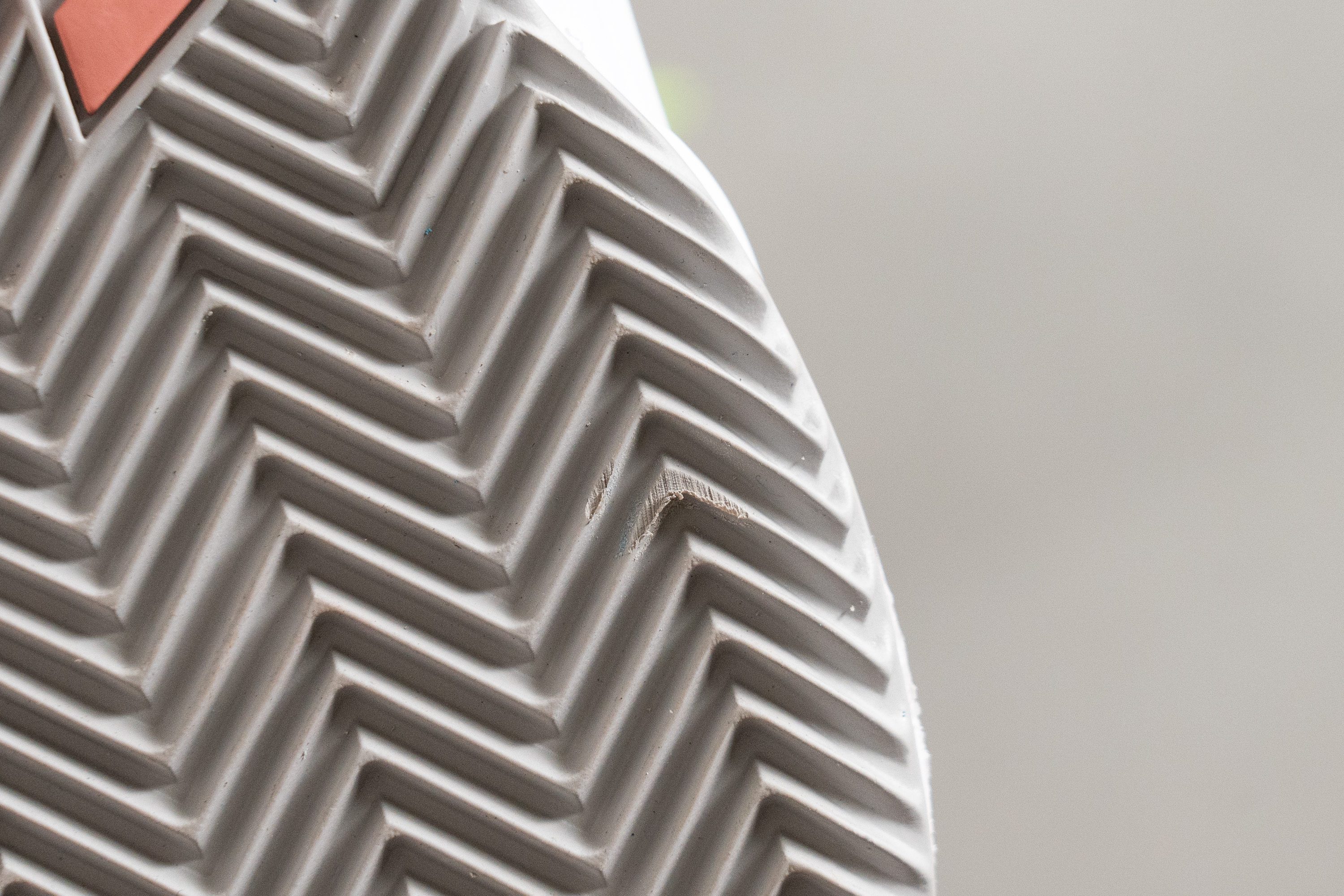
| Barricade 13 Clay | 1.1 mm |
| Average | 0.7 mm |
Outsole thickness
There is no shortage of rubber on the Barricade 13 Clay either. Measuring its thickness with a caliper returned 4.5 mm which is ideal for a tennis shoe.
| Barricade 13 Clay | 4.5 mm |
| Average | 4.2 mm |
Misc
Insole thickness
The more, the merrier! Adidas decided to pack a few extra millimeters of padding into the insole of the Barricade 13. With a caliper measurement of 7.4 mm, it is one of the thickest insoles we've recorded in our lab.
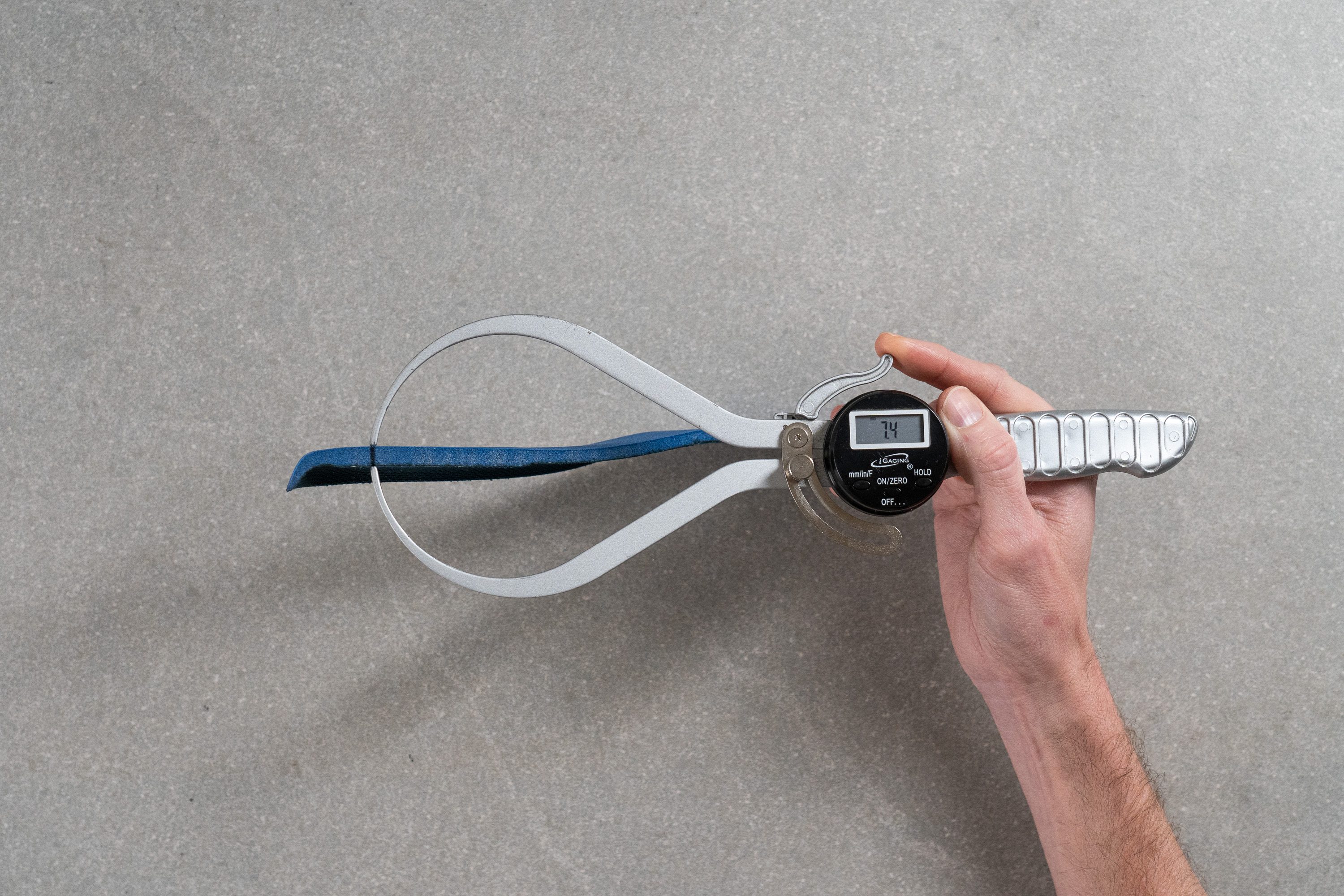
| Barricade 13 Clay | 7.4 mm |
| Average | 5.1 mm |
Removable insole
Whether you need more space inside the Baricade 13 Clay or you want to wear your own orthotic, the shoe easily allows that with its removable insole.
| Barricade 13 Clay | Yes |
Tongue padding
The in-shoe padding is kept at a minimum in the Barricade 13 Clay but it is very thoughtfully placed.
In the tongue, for example, our caliper showed 5.2 mm of foam which is thinner than the average but is
| Barricade 13 Clay | 5.2 mm |
| Average | 8.2 mm |
Tongue: gusset type
The Adidas Barricade 13 Clay features a unique asymmetrical tongue and lacing which we've grown very fond of since the shoe's previous edition.
The tongue is fully attached on the sides eliminating any risk of shifting or sliding. Feeling like one with the foot, it added a lot of confidence to our most shifty footwork on the court.
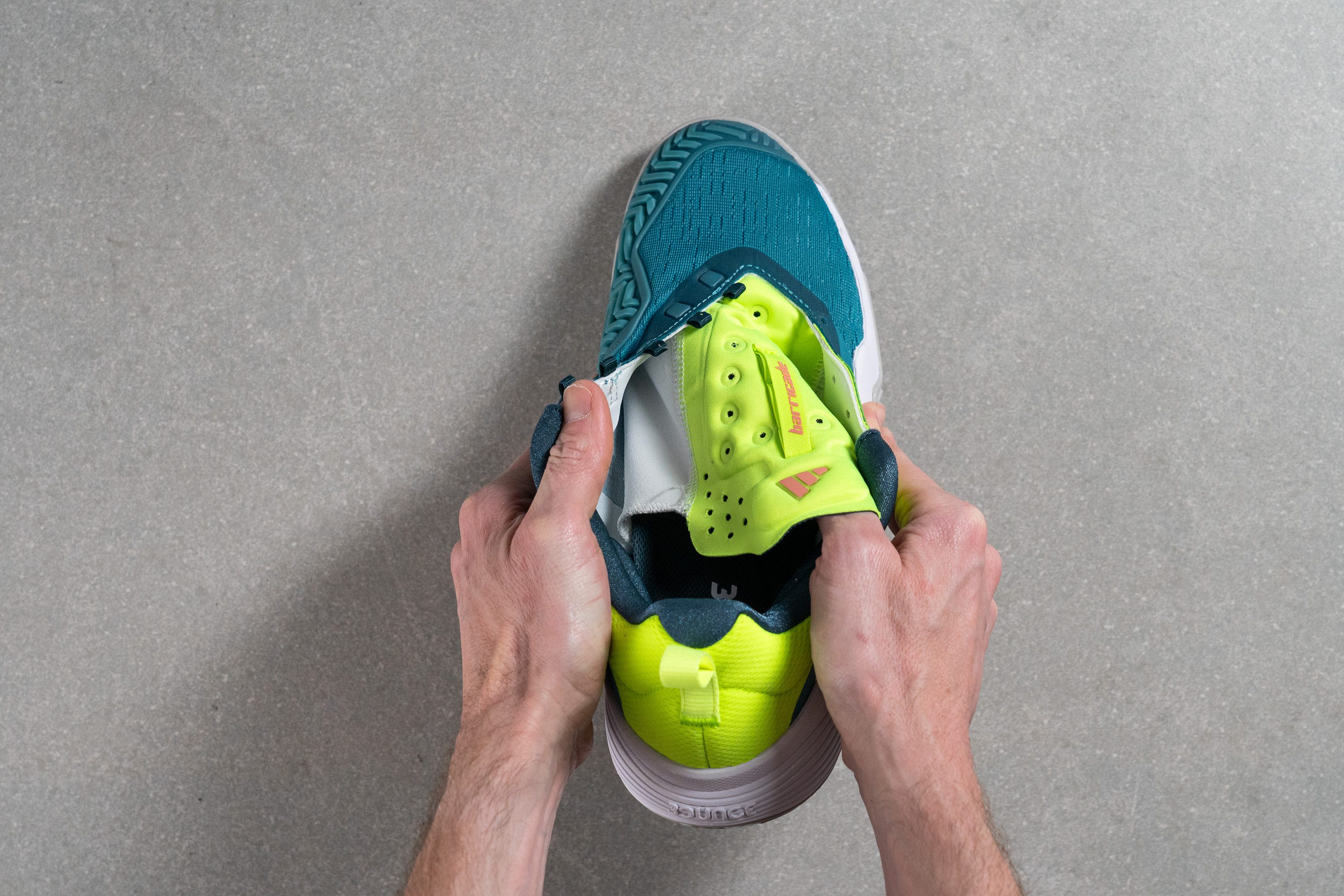
| Barricade 13 Clay | Both sides (full) |
Heel tab
Given the shoe's fully attached tongue, it can be rather tricky to get it on quickly. So the presence of a finger loop that can actually fit a finger is very welcome.
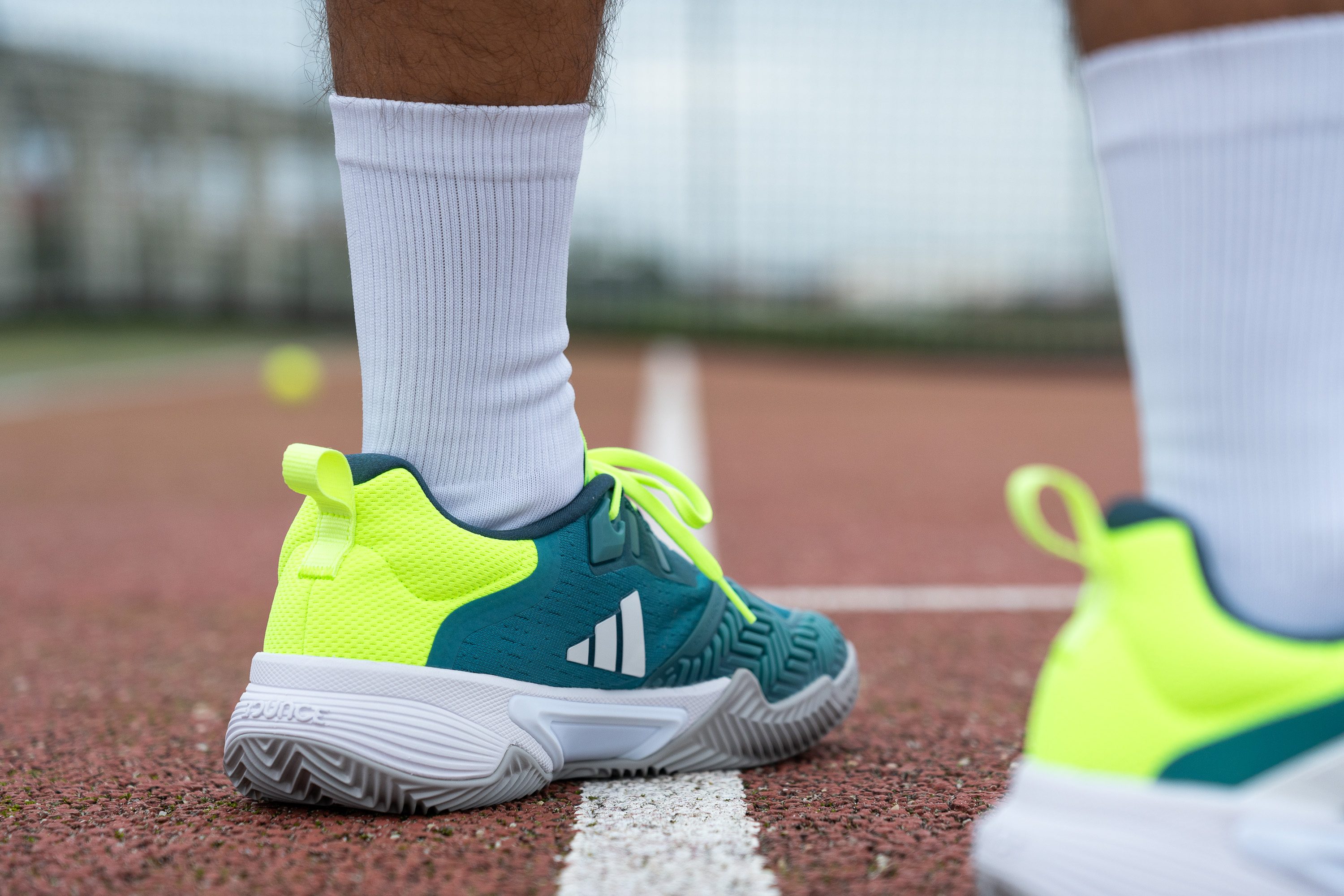
| Barricade 13 Clay | Finger loop |

